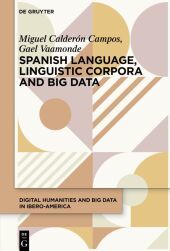
Linguistic Corpora and Big Data in Spanish and Portuguese
Sorozatcím: Humanidades Digitales y Big Data en Iberoamérica / Digital Humanities and Big Data in Ibero-America; 4;
-
5% KEDVEZMÉNY?
- A kedvezmény csak az 'Értesítés a kedvenc témákról' hírlevelünk címzettjeinek rendeléseire érvényes.
- Kiadói listaár EUR 104.95
-
43 528 Ft (41 455 Ft + 5% áfa)
Az ár azért becsült, mert a rendelés pillanatában nem lehet pontosan tudni, hogy a beérkezéskor milyen lesz a forint árfolyama az adott termék eredeti devizájához képest. Ha a forint romlana, kissé többet, ha javulna, kissé kevesebbet kell majd fizetnie.
- Kedvezmény(ek) 5% (cc. 2 176 Ft off)
- Kedvezményes ár 41 351 Ft (39 382 Ft + 5% áfa)
Iratkozzon fel most és részesüljön kedvezőbb árainkból!
Feliratkozom
43 528 Ft

Beszerezhetőség
Megrendelésre a kiadó utánnyomja a könyvet. Rendelhető, de a szokásosnál kicsit lassabban érkezik meg.
Why don't you give exact delivery time?
A beszerzés időigényét az eddigi tapasztalatokra alapozva adjuk meg. Azért becsült, mert a terméket külföldről hozzuk be, így a kiadó kiszolgálásának pillanatnyi gyorsaságától is függ. A megadottnál gyorsabb és lassabb szállítás is elképzelhető, de mindent megteszünk, hogy Ön a lehető leghamarabb jusson hozzá a termékhez.
A termék adatai:
- Kiadás sorszáma 1
- Kiadó De Gruyter
- Megjelenés dátuma 2024. október 21.
- ISBN 9783110781458
- Kötéstípus Keménykötés
- Terjedelem237 oldal
- Méret 230x155 mm
- Súly 468 g
- Nyelv angol
- Illusztrációk 42 Tables, black & white; 34 Illustrations, black & white; 6 Illustrations, color 605
Kategóriák
Rövid leírás:
The series presents interdisciplinary studies harnessing humanistic as well as digital tools to offer innovative approaches to literary studies, linguistics, critical theory and philosophy in the 21st-century Ibero-American space. Along three main lines of research - digital corpora, experimental linguistics, and the relation between literature, critique and big data - it transcends dataism to open new perspectives within Digital Humanities.
TöbbHosszú leírás:
In recent decades, corpus linguistics has experienced tremendous development in the Hispanic world, along two opposite but complementary approaches: increase in corpus size (corpus linguistics as Big Data) and improvement in document selection and data annotation (corpus linguistics as High Quality Data). The first approach has led to the creation of massive corpora such as EsTenTen; at the same time, it has promoted the use of the web and social networks as corpora. The second perspective gives rise to specialized corpora such as Post Scriptum or Oralia Diacrónica del espa?ol (ODE). The contributions gathered in this volume combine both methods in order to exploit their advantages and to overcome their possible limitations. On the one hand, it addresses the creation and design of small corpora focused on data quality; on the other hand, it offers case studies that make use of both specialized corpora and massive data extracted from the web. Highlighting the complementary nature of both methods is the main idea of this book.
Több



